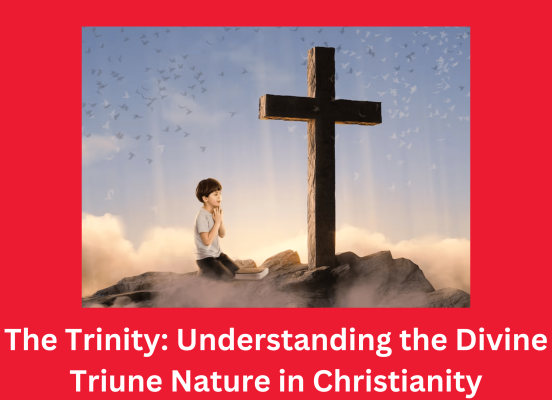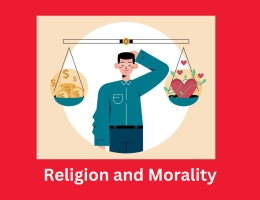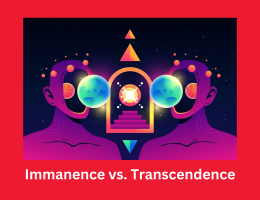
The Trinity: Understanding the Divine Triune Nature in Christianity
- By admin --
- Friday, 08 Mar, 2024
At the middle of Christian theology is the idea of the Trinity, which functions as a tenet that explains the complexity of God. The concept that God is one essence existent in 3 separate parents—the Father, the Son (Jesus Christ), and the Holy Spirit—is on the coronary heart of this idea. In a Christian way, these three concepts of God became theological and contemplative through viewing the painting, influencing the worship, ritual and consciousness of hundreds of thousands of lovers around the world. We will study the scriptural roots, historical development, theological relevance, and impact for Christianity and life as we study the concept of the Trinity.
The New Testament scriptures, in which one-of-a-kind chapters provide insights into the hard nature of God as Father, Son, and Holy Spirit, are the deliver of the Trinity. Jesus refers to the triune method of baptism on the equal time as he directs his disciples to baptize "within the name of the Father and of the Son and of the Holy Spirit" (Matthew 28:19) inside the Gospel of Matthew. In a similar vein, Jesus pledges to ship the Holy Spirit to function a counselor and manual for his followers in the Gospel of John, speakme of his cohesion with the Father (John 14:sixteen–17). The basis for the boom of Trinitarian theology inside the early Christian network is laid by using manner of those and other biblical texts.
Early Christian theologians spoke of the nature of God and the unique relationship between the Father, Son and Holy Spirit, leading to the concept of the Trinity beginning with the theologian Tertullian, who first used the term "Trinity" when he attempted to he will see it , he became one of the most vocal critics of this development but debates about the essence of Christ and his identity with the divine and human natures led to the transformation of Trinitarian theology as a strictly Christian doctrine only appropriate.
The Nicene Creed, which declared that Christ is divine and that he is "of one substance with the Father" (homoousios), end up formulated on the Council of Nicaea in 325 AD. This council modified into critical in elucidating and reaffirming the Trinity idea due to the fact the widespread view of God. The vocabulary and phrases used to particular Trinitarian doctrine have been in addition superior at later councils, together with the one in Constantinople in 381 AD, which affirmed the overall deity and equality of the Holy Spirit inside the Godhead.
The concept of the Trinity has incredible theological significance in Christianity, affecting how people understand the gender, revelation and redemptive role of God in the cosmos. Essentially, each of the Trinitarian doctrines posits three persons in a divine nature (hypostases) and God as one divine nature (ousia). The in detail related individual of God, existing in eternal fellowship and love within the Trinity, contemplates this feeling of cohesion from a distance.
As the primary vessel of the Trinity, the daddy is viewed as the author and dispenser of all matters, the divine ruler of salvation, and the quasi-devoted father who gives and gives of himself to his children. The 2nd member of the Trinity, the Son, is Jesus Christ. He have grow to be made human thru the Virgin Mary, led a sinless existence at the bypass to compensate for humanity's sins, and resurrected from the vain to overcome dying. Jesus made peace between God and mankind by applying His atoning life and resurrection, opening the door to salvation and eternal dwelling.
The Holy Spirit, 1/3 of the Trinity, is the inspiration and supernatural presence that works throughout the world to multiply believers, to sanctify the Church, and to guide people in the order of righteousness and truth. The Spirit, who indwells believers, leads them on their non secular trips, and empowers them to testify to God's love and splendor, is the recommend and comforter that Jesus promised.
The theology of the Trinity also affects Christian spirituality, worship, and prayer, influencing Christians' devotional lives and liturgical rituals. Christian worship regularly uses trinitarian formulations as demonstrations of religion within the triune God, at the side of the Sign of the Cross or the Trinitarian doxology ("Glory be to the Father, and to the Son, and to the Holy Spirit"). Similarly, Christian morality and ethics are informed by a trinitarian theology that emphasizes the value of love, unity, and communicative order to express the triune nature of God.
To give up the idea of a Trinity of 3 reinforces the idea of a married God dwelling among men: Father, Son, and Holy Spirit. It is a important and one-of-a-type theology inside Christianity. Trinitarian principle remains a cornerstone of Christian identification and faith for the reason that it's miles based totally totally on biblical revelation, advanced through theological inquiry, and upheld by means of the usage of early church councils. It calls Christians to a much broader involvement in the life of the triune God who's love, a better comprehension of God's person, and a richer experience of divine presence.





